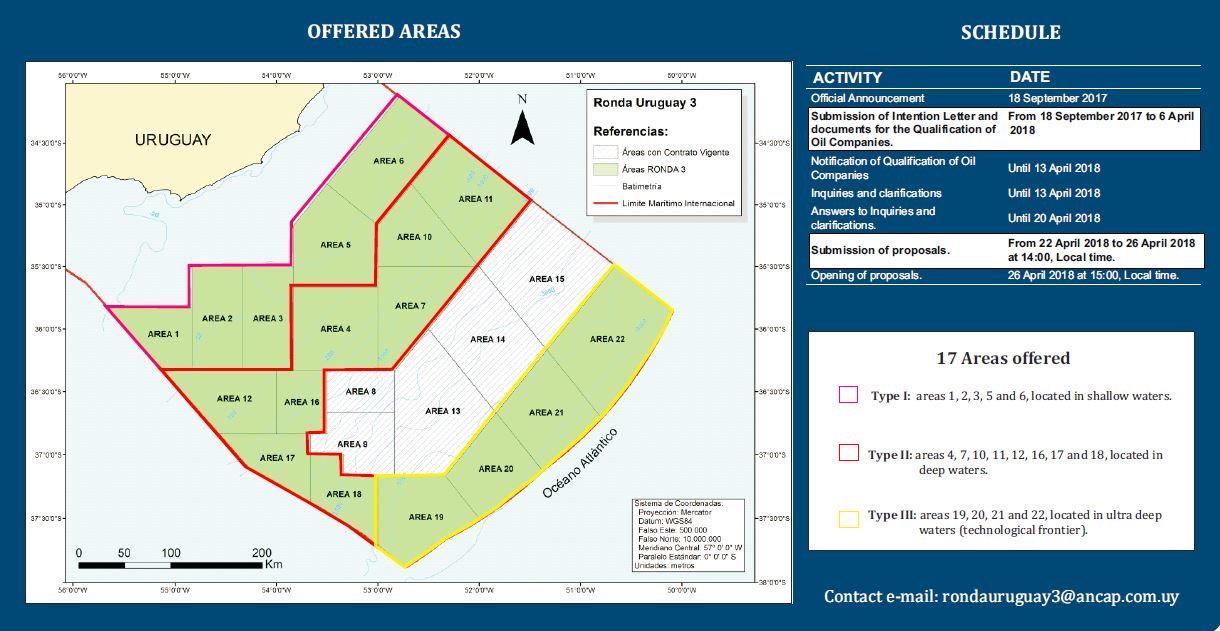Can Uruguay Strike Black Gold? Offshore Oil Exploration's Potential

Table of Contents
H2: Uruguay's Offshore Potential: Untapped Resources and Geological Surveys
Uruguay's coastline holds significant, albeit largely untapped, potential for hydrocarbon reserves. Extensive geological surveys have identified several promising areas for offshore oil exploration.
H3: Identifying Promising Exploration Blocks:
The exploration focus centers primarily on several sedimentary basins along the Uruguayan continental shelf. These basins exhibit geological characteristics consistent with the presence of hydrocarbons.
- Punta del Diablo Basin: Known for its thick sedimentary layers and proximity to proven oil and gas fields in neighboring countries.
- Pelotas Basin: A large basin extending across the maritime borders of Uruguay, Argentina, and Brazil, showcasing significant potential for hydrocarbon accumulation.
- Deepwater Areas: Emerging technologies allow for exploration in deeper waters, opening up vast, previously inaccessible areas.
These basins are characterized by:
- Significant thicknesses of Cretaceous and Tertiary sedimentary rocks, known to be prolific hydrocarbon source rocks.
- Presence of structural traps and stratigraphic traps, essential for the accumulation of oil and gas.
- Water depths ranging from shallow coastal areas to several thousand meters in deeper water exploration blocks.
H3: Technological Advancements Enabling Exploration:
Modern technology is key to unlocking Uruguay's offshore potential. Advanced techniques significantly improve the accuracy and efficiency of exploration while minimizing environmental impact.
- 3D Seismic Surveys: These high-resolution surveys provide detailed images of subsurface geology, allowing for precise identification of potential hydrocarbon reservoirs.
- Advanced Drilling Technologies: Horizontal drilling and multilateral well techniques maximize hydrocarbon recovery while reducing the number of wells required.
- Remote Sensing and Satellite Imagery: Used for preliminary geological assessments and to monitor environmental conditions during exploration.
These technologies allow for the detection of smaller, previously undetectable hydrocarbon deposits, maximizing the potential return on investment.
H2: Economic Implications of Offshore Oil Discovery in Uruguay
The successful discovery and extraction of offshore oil could have profound economic implications for Uruguay.
H3: Potential for Economic Growth and Diversification:
- GDP Growth: A significant increase in GDP is projected, boosting the overall economic standing of the nation. Estimates vary, but some projections suggest a substantial contribution to national income.
- Job Creation: The oil and gas industry is labor-intensive, creating numerous jobs in exploration, extraction, processing, transportation, and related services.
- Increased Government Revenue: Royalties, taxes, and licensing fees associated with oil production would significantly bolster government revenues, funding essential public services and infrastructure projects.
- Foreign Investment: Offshore oil exploration attracts significant foreign direct investment, further stimulating economic activity and technological advancement.
H3: Challenges and Risks Associated with Oil Revenue Management:
While promising, the management of oil revenues presents significant challenges:
- The "Resource Curse": The risk of mismanaging oil wealth and hindering economic diversification is a real concern. Transparency and responsible governance are crucial to avoid this pitfall.
- Price Volatility: Global oil prices fluctuate dramatically, creating uncertainty in revenue streams. Effective financial management strategies are needed to mitigate this risk.
- Corruption: Robust anti-corruption measures are vital to ensure that oil revenues benefit the entire nation, not just a select few.
Strategies like establishing a sovereign wealth fund, investing in education and diversification, and promoting transparency are key to maximizing the benefits and mitigating the risks associated with oil revenue.
H2: Environmental Considerations and Sustainability in Offshore Oil Exploration
Environmental protection must be a central consideration in any offshore oil exploration endeavor.
H3: Minimizing Environmental Impact:
Offshore oil exploration carries inherent environmental risks, including:
- Oil Spills: Strict safety protocols, advanced spill response technologies, and rigorous environmental monitoring are essential to minimize the risk of spills and their devastating consequences.
- Habitat Disruption: Exploration and extraction activities can disturb marine ecosystems. Careful site selection, mitigation measures, and post-operational habitat restoration are necessary to lessen this impact.
- Greenhouse Gas Emissions: The combustion of fossil fuels contributes to climate change. Uruguay must strive to minimize emissions associated with oil extraction and prioritize the development of renewable energy sources.
H3: Balancing Economic Development with Environmental Protection:
Uruguay has an opportunity to adopt a balanced approach, integrating sustainable practices into its energy strategy.
- Renewable Energy Investments: Investing in renewable energy sources like wind and solar power can mitigate the long-term reliance on fossil fuels and diversify the energy sector.
- Environmental Impact Assessments: Comprehensive environmental impact assessments are crucial for evaluating potential risks and developing effective mitigation strategies.
- International Best Practices: Adopting international best practices in environmental management and regulation is critical for ensuring responsible and sustainable offshore oil exploration.
3. Conclusion:
Offshore oil exploration in Uruguay presents a significant opportunity for economic growth and diversification, but it also necessitates careful consideration of environmental protection and responsible resource management. Success hinges on transparent governance, strategic investment in renewable energy, and adherence to international best practices. To learn more about the exciting developments and potential of Uruguay's offshore oil potential, explore the resources available from the Ministry of Industry, Energy and Mining. The future of oil exploration in Uruguay demands a commitment to both economic prosperity and environmental sustainability, ensuring a brighter future for generations to come.

Featured Posts
-
 Farrah Abraham Examining The Impact Of Teen Mom On Her Life And Career
May 11, 2025
Farrah Abraham Examining The Impact Of Teen Mom On Her Life And Career
May 11, 2025 -
 Tom Cruises Unique Gesture After Suri Cruises Birth
May 11, 2025
Tom Cruises Unique Gesture After Suri Cruises Birth
May 11, 2025 -
 The Next Flight A Former Sia Air Stewardesss Post Aviation Life
May 11, 2025
The Next Flight A Former Sia Air Stewardesss Post Aviation Life
May 11, 2025 -
 Mntn Ipo Ryan Reynolds Company Eyes Next Week Launch
May 11, 2025
Mntn Ipo Ryan Reynolds Company Eyes Next Week Launch
May 11, 2025 -
 Le Regret De Sylvester Stallone Son Thriller D Action Cobra Des Annees 80
May 11, 2025
Le Regret De Sylvester Stallone Son Thriller D Action Cobra Des Annees 80
May 11, 2025
